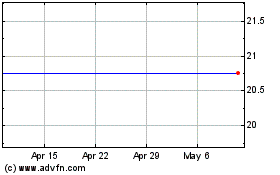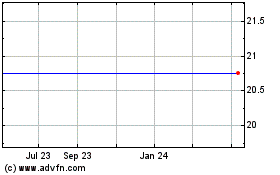Mexico Launches Bidding for Shared Mobile Network
January 29 2016 - 4:10PM
Dow Jones News
MEXICO CITY—The Mexican government began the bidding process
Friday for a wholesale network that officials expect will make
mobile broadband service available to at least 85% of the
population, while lowering Internet costs for operators and
consumers.
The bidding rules come a year later than originally planned
following field tests and a series of public consultations on the
project, which was included in the 2013 overhaul of the country's
telecommunications laws.
The network will use spectrum freed up by last year's switch
from analog to digital television. The government will contribute
the spectrum in a public-private partnership, with private partners
putting up investment and financing to build the network,
Communications and Transport Minister Gerardo Ruiz Esparza said at
a news conference.
The government will charge heavily discounted rates for use of
the spectrum. Telecoms regulator Gabriel Contreras said the lack of
spectrum has been behind Mexico's slow development of mobile
Internet.
Deputy Communications Minister Monica Aspe said estimated
investment in the project will be from $3.5 billion to reach the
minimum coverage and $7 billion in the event it extends to 95% of
the population. Coverage will be the key factor awarding the
project. Bids are expected in early August, with a winner to be
announced later that month.
The network is expected to start operating in early 2018,
reaching 30% of the population and extending to at least 85% after
five years. At least 15% of the progress in building the network
has to be in rural areas, covering towns with fewer than 10,000
inhabitants.
As of mid-2015, Mexico had 54.6 million mobile broadband
subscriptions, or 45 per 100 inhabitants, according to regulators.
Officials estimate the shared network eventually could double the
number of people with access to wireless Internet.
The wholesale network will lease capacity on nondiscriminatory
terms to mobile and fixed-line phone operators, and while existing
operators can participate in consortia, they can't have any
influence over the running of the shared network.
The success of the network will depend on how quickly it is
built, and how attractive the costs are to mobile service providers
who under current telecommunications laws have no incentives to
expand into rural areas, said Jorge Negrete, head of the
telecommunications consultancy Mediatelecom Policy & Law.
"Half of the country is disconnected," he said. "Mexico needs 50
million more mobile lines."
Once the Congress, in reforming the telecommunications laws,
decided on the shared network as opposed to imposing coverage
requirements on existing operators, the project became the only
option, he added.
"The numbers don't work out when each operator has to reach
rural areas with their own network," Ms. Aspe said. When there is a
single network, with efficient spectrum such as the 700 megahertz
band, costs are much lower. "That allows selling at lower prices to
end users, and more people can afford to contract the service," she
added.
Mexico's mobile market is currently divided among three main
operators: Amé rica Mó vil SAB, Spain's Telefó nica SA and AT&T
Inc.
Write to Anthony Harrup at anthony.harrup@wsj.com
(END) Dow Jones Newswires
January 29, 2016 15:55 ET (20:55 GMT)
Copyright (c) 2016 Dow Jones & Company, Inc.
America Movil SAB de CV (NYSE:AMOV)
Historical Stock Chart
From Oct 2024 to Nov 2024

America Movil SAB de CV (NYSE:AMOV)
Historical Stock Chart
From Nov 2023 to Nov 2024
